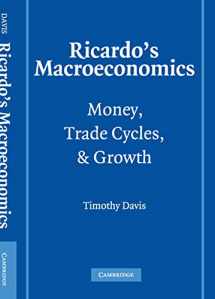
Ricardo's Macroeconomics: Money, Trade Cycles, and Growth (Historical Perspectives on Modern Economics)
ISBN-13:
9780521169271
ISBN-10:
0521169275
Author:
Timothy Davis
Publication date:
2010
Publisher:
Cambridge University Press
Format:
Paperback
330 pages
FREE US shipping
Book details
ISBN-13:
9780521169271
ISBN-10:
0521169275
Author:
Timothy Davis
Publication date:
2010
Publisher:
Cambridge University Press
Format:
Paperback
330 pages
Summary
Ricardo's Macroeconomics: Money, Trade Cycles, and Growth (Historical Perspectives on Modern Economics) (ISBN-13: 9780521169271 and ISBN-10: 0521169275), written by authors
Timothy Davis, was published by Cambridge University Press in 2010.
With an overall rating of 4.1 stars, it's a notable title among other
books. You can easily purchase or rent Ricardo's Macroeconomics: Money, Trade Cycles, and Growth (Historical Perspectives on Modern Economics) (Paperback) from BooksRun,
along with many other new and used
books
and textbooks.
And, if you're looking to sell your copy, our current buyback offer is $0.3.
Description
The outline of modern macroeconomics took shape in Britain in the early nineteenth century thanks, in part, to David Ricardo, one of the most influential economists of the time. Britain was challenged by monetary inflation, industrial unemployment and the loss of jobs abroad. Ricardo pointed the way forward. As a financier and Member of Parliament, he was well versed in politics and commercial affairs. His expertise is shown by the practicality of his proposals, including the resumption of the gold standard, which was essential given the destabilizing policy of the Bank of England. Ricardo's expertise appears also in his debate with T. R. Malthus about whether an industrial economy can suffer a prolonged depression. Say's Law of Markets and the Quantity Theory of Money figure prominently in his works, but not in an extreme form. He was instead a subtle theorist, recognizing the non-neutrality of money, trade depressions and unemployment.


We would LOVE it if you could help us and other readers by reviewing the book
Book review

Congratulations! We have received your book review.
{user}
{createdAt}
by {truncated_author}


